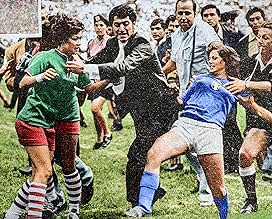अपनी भाषा में प्लॉट जोड़ेंTold by the pioneering women who participated, this is the extraordinary story of the 1971 Women's Soccer World Cup, a tournament witnessed by record crowds that has been written out of spor... सभी पढ़ेंTold by the pioneering women who participated, this is the extraordinary story of the 1971 Women's Soccer World Cup, a tournament witnessed by record crowds that has been written out of sporting history - until now.Told by the pioneering women who participated, this is the extraordinary story of the 1971 Women's Soccer World Cup, a tournament witnessed by record crowds that has been written out of sporting history - until now.
- निर्देशक
- लेखक
- स्टार
- पुरस्कार
- 2 जीत और कुल 10 नामांकन
Jaime De Haro
- Self
- (वॉइस)
Stanley Rous
- Self
- (आर्काइव फ़ूटेज)
फ़ीचर्ड समीक्षाएं
This film brought me so much joy but also left me with a sad rage. To think of where women's football could be now if it wasn't for frail male egos. It's such a well made film and all ex players involved tell the story so well, you can see how emotional they still are and what it meant to be a part of this wonderful tournament that was hidden from history. The match footage is so well restored and it felt amazing to see it on the big screen. I just wish we hadn't been denied so many years of great tournaments and a history of great players. It ended on a positive though, as someone who regularly attends matches and follows the WSL and the Lionesses passionately I feel very confident that the sport will continue to grow. It's a testament to those wonderful players in 71.
This is a great documentary and a must-watch for everyone. I knew about Copa 71 before I watched the movie, but I din't know much of the details. I was crying my eyes out, out of anger and frustration.
At one point, when they interview some of the Argentinian women and they mention how little support they got from their federation, I imediately thought about last weeks news that the now active Argentinian womens team only got a banan and a sandwich for lunch at their last assembly. While progress in womens football has exploded in the last few years it is vital that we all help making sure that every country support the womens team as much as the mens team.
Anyway. Watch this movie and weep. Then rise up and organize.
At one point, when they interview some of the Argentinian women and they mention how little support they got from their federation, I imediately thought about last weeks news that the now active Argentinian womens team only got a banan and a sandwich for lunch at their last assembly. While progress in womens football has exploded in the last few years it is vital that we all help making sure that every country support the womens team as much as the mens team.
Anyway. Watch this movie and weep. Then rise up and organize.
"Copa 71" premiered at TIFF last month, and made its US debut at DocFest as part of the Seattle Independent Film Festival. It received rave reviews at both, so it's telling that as of this writing it's currently rocking a 4.5/10 on IMDb for what is probably the most egregious sin of all-- treating women like human beings.
The film has one primary focus, as shown in the title: In 1971, in Mexico City and Guadalajara, a non-FIFA Women's World Cup was held. Six teams were invited, and where the tournament holders imagined it a sideshow, they had dollar signs in their eyes and stadiums to fill (FIFA denied them the use of the regular stadiums, so they were 'forced' into the two largest stadiums in the country).
As a film, its focus is narrow, but that singular focus is so utterly fascinating, and the players so passionate, that this is hardly a complaint. The burial of this sporting event is mentioned barely at all, the film doesn't even make mention of the next (also overlooked) women's tournament in 1985, skipping to the first official FIFA sanctioned event in 1991.
These are minor concerns, as the film is necessary both as an educational tool, and as a historical document. I'm male, I've got a basic familiarity with soccer, but like all great sports documentaries, you can go in blind and be captivated by the story they're trying to tell, regardless. Yes, the open sexism these women had to deal with is still alive and well (see: the current IMDb rating), but that is less the focus than the very real fact that even in 1971, women playing soccer sold out a 110,000 seat stadium.
You can't not love these women, unless you're the unfortunate type of person who never cared for women in the first place. If that's you, you don't need to review bomb, just find something else to be mad about. Women's soccer is the fastest growing sport in the world, and this documentary is a testament that it's been a long time coming.
The film has one primary focus, as shown in the title: In 1971, in Mexico City and Guadalajara, a non-FIFA Women's World Cup was held. Six teams were invited, and where the tournament holders imagined it a sideshow, they had dollar signs in their eyes and stadiums to fill (FIFA denied them the use of the regular stadiums, so they were 'forced' into the two largest stadiums in the country).
As a film, its focus is narrow, but that singular focus is so utterly fascinating, and the players so passionate, that this is hardly a complaint. The burial of this sporting event is mentioned barely at all, the film doesn't even make mention of the next (also overlooked) women's tournament in 1985, skipping to the first official FIFA sanctioned event in 1991.
These are minor concerns, as the film is necessary both as an educational tool, and as a historical document. I'm male, I've got a basic familiarity with soccer, but like all great sports documentaries, you can go in blind and be captivated by the story they're trying to tell, regardless. Yes, the open sexism these women had to deal with is still alive and well (see: the current IMDb rating), but that is less the focus than the very real fact that even in 1971, women playing soccer sold out a 110,000 seat stadium.
You can't not love these women, unless you're the unfortunate type of person who never cared for women in the first place. If that's you, you don't need to review bomb, just find something else to be mad about. Women's soccer is the fastest growing sport in the world, and this documentary is a testament that it's been a long time coming.
You would have to be mad not to have come to the conclusion that FIFA is populated with grey, humourless, rule-book wielding bureaucrats. And thats not to even mention the corruption, what with the bribes, the thousands of migrant workers dead building large stadiums when a rich desert country with no interest in football was awarded a World Cup or what about when Legia Warsaw unveiled a huge banner to commemorate the murdered 160,000 Poles by the Nazis in the Warsaw Uprising - FIFA's response to this act of education and remembrance? A £42,000 fine for Legia Warsaw of course! But don't worry because this film clearly indicates that FIFA were also 24 carat bell-ends way back in 1971 as well! Well, consistency is a positive attribute of sorts I guess.
This film tells a pretty amazing story in a lot of ways. Amazing because hardly anyone seems to have known a thing about it for 50 years. It's the story of the first women's World Cup which happened way back in 1971. But it doesn't count as the first women's World Cup...because FIFA didn't 'approve' it. Furthermore, they insisted that the Mexican clubs pencilled in to host the thing must under no circumstances do so or face heavy fines. Ironically, their petty intransigence led to the tournament being forced to be played out in the two largest stadiums in the country which were not under FIFA jurisdiction, including the iconic Azteca stadium in Mexico City. Whats actually fairly incredible was that the promoters succeeded epically in selling the tournament and games played out to crowds of 110,000 in an uproarious atmosphere. The competition itself looked amazing and, like the legendary men's World Cup of 1970, clearly benefitted from being played out in such a passionate environment. There are silky skills, 1970's assaults...I mean legitimate tackles, an unfeasibly bad tempered semi-final between Italy vs Mexico where in one photograph we have the brilliantly incongruous sight of an Italian player who looks like Claudia Cardinale being held back from physically assaulting a Mexican opponent, there's a pay strike on the eve of the final, there's amazing goals chalked off for questionable technicalities and its all narrated by gloriously over-the-top Latin football commentary - in other words, its entertainment all the way! The tournament even had a super-cool looking mascot!
So, you may think, this is great - football at its most life-affirming! This will take the game forward! Meanwhile, back in Switzerland...FIFA continued to take the huff. The women received bans, some were barely acknowledged in their own countries for their efforts and many became quickly disillusioned with the game due to some very poor treatment. The tournament was to all intents and purposes buried. The doc is made up of the remembrances of many of the participants from the various competing teams. I found all these women to be full of humour and vitality. They have been treated pretty poorly though. It wasn't until 20 years after this event that the first official FIFA sponsored women's World Cup took place. To me, it seems like a no-brainer for this to now be officially regarded in the history books as the first female World Cup - after all, the first men's one in 1930 was invitation only and that's official. You would think after all the things they have got so epically wrong over the last few years that FIFA could do something positive, do the right thing and make this tournament official...but will they?
This film tells a pretty amazing story in a lot of ways. Amazing because hardly anyone seems to have known a thing about it for 50 years. It's the story of the first women's World Cup which happened way back in 1971. But it doesn't count as the first women's World Cup...because FIFA didn't 'approve' it. Furthermore, they insisted that the Mexican clubs pencilled in to host the thing must under no circumstances do so or face heavy fines. Ironically, their petty intransigence led to the tournament being forced to be played out in the two largest stadiums in the country which were not under FIFA jurisdiction, including the iconic Azteca stadium in Mexico City. Whats actually fairly incredible was that the promoters succeeded epically in selling the tournament and games played out to crowds of 110,000 in an uproarious atmosphere. The competition itself looked amazing and, like the legendary men's World Cup of 1970, clearly benefitted from being played out in such a passionate environment. There are silky skills, 1970's assaults...I mean legitimate tackles, an unfeasibly bad tempered semi-final between Italy vs Mexico where in one photograph we have the brilliantly incongruous sight of an Italian player who looks like Claudia Cardinale being held back from physically assaulting a Mexican opponent, there's a pay strike on the eve of the final, there's amazing goals chalked off for questionable technicalities and its all narrated by gloriously over-the-top Latin football commentary - in other words, its entertainment all the way! The tournament even had a super-cool looking mascot!
So, you may think, this is great - football at its most life-affirming! This will take the game forward! Meanwhile, back in Switzerland...FIFA continued to take the huff. The women received bans, some were barely acknowledged in their own countries for their efforts and many became quickly disillusioned with the game due to some very poor treatment. The tournament was to all intents and purposes buried. The doc is made up of the remembrances of many of the participants from the various competing teams. I found all these women to be full of humour and vitality. They have been treated pretty poorly though. It wasn't until 20 years after this event that the first official FIFA sponsored women's World Cup took place. To me, it seems like a no-brainer for this to now be officially regarded in the history books as the first female World Cup - after all, the first men's one in 1930 was invitation only and that's official. You would think after all the things they have got so epically wrong over the last few years that FIFA could do something positive, do the right thing and make this tournament official...but will they?
If this documentary is not nominated to an Oscar or an Emmy, it is a crime.
The subject is quite niche but the undertones of a social statement are there. It's denouncing one of the greatest injustices in sports history. To think this was hidden for so many years just because it was a woman's event it's almost unbelievable.
The first hands stories of these pioneers are grappling and inspiring.
The perspective of those who comment through experience and how they got to the 71 event makes this probably the best sports documentary ever made.
If you believe in social causes, football, or just plain storytelling, this is it.
The subject is quite niche but the undertones of a social statement are there. It's denouncing one of the greatest injustices in sports history. To think this was hidden for so many years just because it was a woman's event it's almost unbelievable.
The first hands stories of these pioneers are grappling and inspiring.
The perspective of those who comment through experience and how they got to the 71 event makes this probably the best sports documentary ever made.
If you believe in social causes, football, or just plain storytelling, this is it.
क्या आपको पता है
- ट्रिवियाCarol Wilson, who played was the England captain in the tournament, was only 19 years old at the time. Three of her teammates, Leah Caleb (age 13), Gill Sayell (14) and Chris Lockwood (15) were still schoolgirls when they played in the tournament.
टॉप पसंद
रेटिंग देने के लिए साइन-इन करें और वैयक्तिकृत सुझावों के लिए वॉचलिस्ट करें
- How long is Copa 71?Alexa द्वारा संचालित
विवरण
- रिलीज़ की तारीख़
- कंट्री ऑफ़ ओरिजिन
- आधिकारिक साइटें
- भाषाएं
- इस रूप में भी जाना जाता है
- Copa '71 - succén som tystades ner
- उत्पादन कंपनियां
- IMDbPro पर और कंपनी क्रेडिट देखें
बॉक्स ऑफ़िस
- दुनिया भर में सकल
- $1,97,067
- चलने की अवधि1 घंटा 30 मिनट
- रंग
- पक्ष अनुपात
- 2.00 : 1
इस पेज में योगदान दें
किसी बदलाव का सुझाव दें या अनुपलब्ध कॉन्टेंट जोड़ें

























